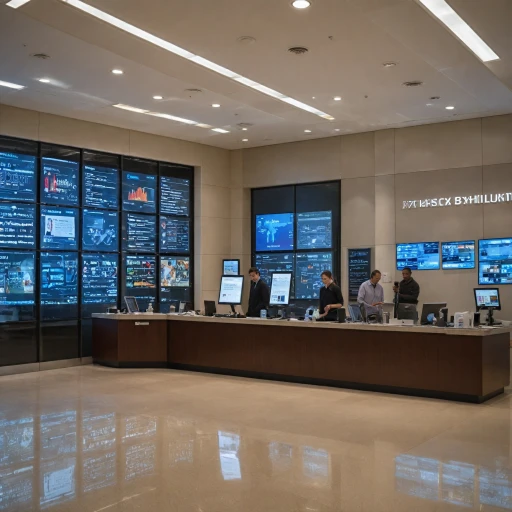Understanding the Unique Value of Brick-and-Mortar Branding
Why Brick-and-Mortar Branding Still Matters
Brick-and-mortar stores have something that online platforms can never fully replicate: the tangible, sensory experience. Walking into a store, feeling the texture of a product, or simply enjoying the ambiance are experiences that digital platforms can't match. This is where the power of brick-and-mortar branding comes into play, offering a unique opportunity to create lasting impressions on customers.
The Emotional Connection
Building an emotional connection with customers in a physical store can lead to increased customer loyalty. When shoppers feel a personal attachment to a brand, they're more likely to return. It's about creating a space where customers feel valued and understood. This can be achieved through personalized customer service, engaging store marketing, and a welcoming atmosphere.
Driving Foot Traffic with Effective Strategies
In the age of digital marketing, it's easy to overlook the importance of foot traffic. However, a well-executed retail marketing strategy can significantly boost in-store visits. This involves integrating social media and SEO tactics to attract local customers. Creative advertising campaigns and promotions can also entice potential buyers to step inside.
Blending Digital and Physical Worlds
While brick-and-mortar stores offer a unique experience, integrating online and offline strategies is essential. This means using social media to showcase in-store events or leveraging email marketing to inform customers about new arrivals. A seamless blend of digital and physical strategies ensures that businesses stay relevant and connected with their target audience.
For more insights on enhancing the customer experience, explore our detailed guide.
Key Elements of an Irresistible Branding Agency
Elements of a Compelling Branding Partner
Imagine walking into a store that you've never been to before — everything about it captivates you, from the scent to the visuals. That's the magic of a strong brand, carefully orchestrated to create memorable customer experiences. A well-coordinated branding agency drives this magic, offering a suite of marketing services across various channels — media, retail, digital, and more. What makes a branding agency truly irresistible? Here's a quick checklist:- Creative Vision: Does the agency have an imaginative team with ideas that stand out?
- Retail Expertise: Do they know the ins and outs of brick and mortar store marketing?
- Digital Prowess: Are they adept at blending online strategies, from social media to SEO, with offline marketing campaigns?
- Data-Driven Decisions: Do they use customer data to tailor marketing strategies, ensuring every campaign is met with a positive reaction?
- Commitment to Results: Are they invested in driving foot traffic and boosting customer loyalty rather than offering just lip service?
Bridge Agency Skills and Business Aims
Here's where the rubber meets the road: ensuring the agency's skills are in harmony with your business goals. More than just a transactional relationship, it's about fostering a partnership where both sides contribute to success.- Open Communication: Regular meetings and clear communication channels can turn simple briefs into actionable strategies that address brand challenges.
- Customer-Centric Approach: When agencies and businesses prioritize the customer experience, everyone wins. It's about seeing your store through the eyes of your customers.
- Shared Metrics for Success: Establish KPIs early on that reflect your desired outcomes, be it increasing store traffic or bolstering online presence.
Aligning Agency Expertise with Business Goals
Expertise that Drives Impactful Results
In the bustling arena of brick-and-mortar branding, aligning an agency's skills with your business goals is just like playing chess — every move counts. It's all about finding those who not only understand retail dynamics but also resonate with the heartbeat of traditional shopping experiences. With the right marketing strategy, the partnership can forge pathways to lasting success. First, think about what you truly want from an agency. Beyond snazzy logos and trendy colors, a great marketing agency should be well-versed in crafting strategies that directly push your business up the ladder. They need a shopping mindset, an online and offline awareness beyond the basic advertising platforms. Marrying their digital marketing finesse with the tactile nature of physical retail is key.Craft the Perfect Business Match
Here's where it gets interesting — the matchmaking process. Look at agencies with a proven track record in projects similar to yours. They must show deftness in pivotal disciplines, particularly those crucial in today's blend of online and physical retail, like:- SEO and content marketing: Visibility matters, so go with an agency that optimizes your presence both in-store and online.
- Social media savvy: Deep engagement keeps your brand lively and in the loop with customers.
- Customer loyalty insights: Agencies who excel here tap into emotional connections, creating experiences that lure customers back.
Focus on a Data-Driven Approach
When examining potential partners, emphasize agencies that thrive on data-driven insights. Marketing strategies formed by weaving through customer behaviors, foot traffic trends, and detailed reporting will arm your brand with the foresight needed to anticipate and meet customer expectations Platforms like email marketing and social media channels, when used effectively, capture valuable data that helps refine your approach. It allows a marketing agency to pivot strategies in real-time, ensuring they’re always on your business wavelength. In this rapidly shifting environment, finding an agency with a specialty in mortar marketing means more than just selecting a service provider. It's about checking the right boxes to elevate your brick-and-mortar presence, ensuring you have the firm footing needed for growth. For more insightful thoughts on aligning sustainable practices with your business policies, take a look at this enlightening piece on integrating sustainability into business strategy for C-suite leaders here.Measuring Success in Brick-and-Mortar Branding
Tracking the Impact of Brick-and-Mortar Branding
To truly grasp the success of your retail branding strategy, it's vital to keep an eye on practicality and results. This isn't just about numbers, but about creating lasting connections with your customers in the store and beyond. Start by analyzing brand perception and loyalty. How do folks talk about your business on social media? Are customers sharing their shopping experiences or recommending your store to others? These conversations provide insights into how well your marketing strategies resonate with your target audience. Consider measuring foot traffic alongside your online engagement. By contrasting these figures, retail businesses can assess whether their offline and digital campaigns are driving people into stores. Go beyond the storefront to evaluate your advertising strategy. Are your retail marketing efforts leading to broader reach and higher returns? Look into media impressions and the effectiveness of your content marketing. Does your storytelling charm customers, prompting them to engage more? Evaluate search engine performance to check if SEO strategies have enhanced visibility. Are folks finding you easily when they search online? This can relate directly to brand awareness and future sales. Finally, keep track of customer feedback on physical and digital touchpoints. Whether through email marketing responses or direct store reviews, customer opinions shape ongoing strategies. Their insights are crucial; after all, satisfied customers not only return but often bring friends. As we explore future trends in part 6, remember that staying attuned to your customers' voices, adapting promptly, and measuring the impact effectively will keep your retail brand vibrant and growing. Metrics are not just numbers; they are your feedback loops to continuously refine your agency's approach, making your marketing campaigns more in tune with business goals.Case Studies: Successful Branding Strategies
Showcasing Real-Life Examples of Winning Branding Techniques
Bringing theory to life, successful branding strategies stoutly demonstrate the magic of fusing creativity, marketing savvy, and strategic thinking. Their success isn’t just quantified through increased foot traffic at a physical store or a spike in sales. It lies in the ripple effects across the brand's reputation and customer loyalty. Proven case studies from a marketing agency often highlight this. Consider a boutique retail outlet overwhelmed with competition from online giants. They decided to breathe life back into their brick-and-mortar operation with an enticing in-store experience. By integrating digital elements into their physical space, they fused the convenience of online shopping with the tangible benefits of a physical store. Social media became their megaphone, amplifying customer experiences and drawing in more foot traffic. Another great example is a traditional bookstore that turned the digital wave to their advantage. Instead of resisting the online shift, they harnessed social media and content marketing to recreate the atmosphere of flipping through pages, right from their customer’s device. That blend of retail marketing and digital flair nudged their brand not just into the hearts of customers but also into the limelight amongst various businesses. Marketing agencies highlighting such strategies aren’t just telling a brand's story. They're crafting a narrative that speaks directly to what customers seek. Amidst all the marketing clamor, what truly matters is the consistent sound of success that resonates from meeting a target audience’s needs, whether through email marketing, SEO, or intuitive social interactions. If you're a business vying for market presence, studying such cases can illuminate the doorways to innovation. It’s where content meets strategy and success meets real business goals. Not just stepping up to the branding plate, but hitting that home run. Real-life brands serve as guides, pointing the way forward in the dynamic interplay of brick and digital landscapes. For more stories and insights on enhancing your brand strategy, here's an article you might find profitable: Driving Business Success Through a Customer-Centric Approach.Future Trends in Brick-and-Mortar Branding
Gazing into Tomorrow's Brick-and-Mortar Marketing
Business evolves, and so does the world of brick-and-mortar branding. The shift in consumer habits, powered by digital channels and social media, isn't just a trend, but a new way to engage customers. Once upon a time, it was all about foot traffic and physical stores, but now we're dealing with digital experiences and online presence overshadowing those confines. Today's successful marketing agency must understand both digital and traditional tactics. Balancing strategies with an online and offline approach is essential. Companies that master this hybrid model will outshine competitors by meeting customers where they are and maximizing potential.Trends Shaping Future Brick-and-Mortar Strategies
- Omni-channel Experiences: Customers want seamless transitions from brick to digital. Ensuring that the shopping experience is cohesive, whether in-store or online, is crucial.
- Data-driven Insights: Access to vast pools of data means understanding your target audience like never before. Smart analytics will guide your marketing campaigns, allowing personalization that boosts customer loyalty.
- Social Media Impact: The media you create needs to be shareable and engaging, bringing the excitement of your store into the digital marketing arenas. This fosters community and brand loyalty.
- Augmented Reality and In-Store Tech: As AR and tech become more prevalent, they transform shopping into an interactive adventure. This makes your brand memorable and keeps customers coming back for more.
- Sustainable Practices: More consumers align themselves with brands that demonstrate concern for the environment. Adopting eco-friendly practices can significantly influence customer preferences.














